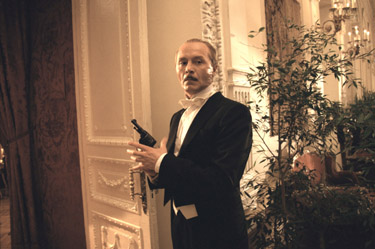|
Reviews of Recent Independent, Foreign, & Documentary Films in Theaters and DVD/Home Video
THE RIDER NAMED DEATH
Despite having an evasive central character, this handsome production holds interest as it steadily
parcels out clues behind the motivation of Georges (Andrei Panin), the head of a terrorist cell
hell-bent on assassinating a grand duke in czarist Russia. Georgesí dapper and opaque visage
rarely alters as he observes the dukeís daily movements. His relentless determination to kill the
authority figure is akin to Captain Ahab and the elusive whale. For one of his comrades, working
class Fyodor (Rostislav Bershauer), striking out at the ruling class is an act of revenge; his wife
was killed by Cossacks during a peaceful demonstration. Self-sacrifice for your fellow man is the
highest ideal for another conspirator, the wide-eye and religious Vanya (Artyem Semakin).
The film is adapted from the 1909 novel The Pale Horse, Memoirs of a Terrorist by Boris
Savinkov, a member of the anti-monarchist Social Revolutionary Party, whose activities included
assassinations. Although the overindulgence of the upper class and the squalid slums
are both depicted, the politics of the time are only referred to; the emphasis is on the personal.
Any connection between terrorism then and today is only indirectly inferred. A possible
objectionable or eyebrow raising sequence occurs in the prologue, where brisk reenactments of
killings and bombing are depicted as silent movies. With all of its exaggerated acting, it stands
apart from the filmís tone and Georgesí demeanor - dry and detached. Set against the backdrop of
the Kremlin and an opulent opera house, this is one of the rare films where you can not only see,
but feel the sweat, even if in the abundant close-ups the heavy make-up on actor
Paninís face is too distractingly obvious. Kent Turner
|
